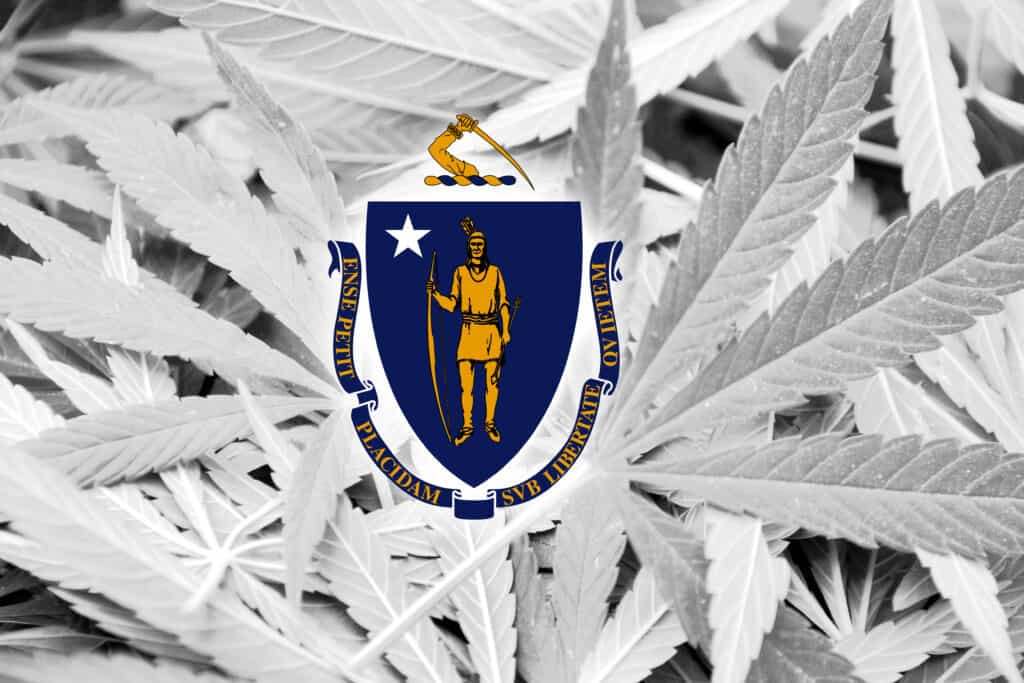It’s been over five years since Massachusetts voters approved a ballot question allowing adults 21 and over to possess and grow cannabis. Retail sales began in 2018 and the state’s cannabis industry has continued to evolve ever since. Let’s catch up on the ins and outs of the Massachusetts cannabis industry to keep you in the know.
Massachusetts cannabis laws for consumers and patients
Cannabis in Massachusetts is legal for both adult recreational use and medical patients. Recreational users may possess up to one ounce of flower and up to five grams of concentrates outside the home. Within the home, adults may possess up to 10 ounces of cannabis as well as any cannabis from plants they cultivated themselves, within a limit of six plants per adult or 12 per household.
Massachusetts medical marijuana patients can purchase no more than 10 ounces every two months.
Wondering if you can use an out-of-state medical marijuana card in Massachusetts? At this time, the answer is no. If you are 21 or over, however, you can purchase adult-use Massachusetts cannabis at a licensed dispensary.
In our previous look at Vermont cannabis, we took a deep dive into what the future of retail may look like for the state. But cannabis in Massachusetts has been on the shelves for three years now. Let’s take a closer look at this state’s operational cannabis industry.
The Massachusetts Cannabis Control Commission
The Cannabis Control Commission (CCC) runs just about everything cannabis-related in the state. It is the CCC’s mission to “honor the will of the voters of Massachusetts by safely, equitably and effectively implementing and administering the laws enabling access to medical and adult-use marijuana in the Commonwealth.”
Adult-use cannabis in Massachusetts is subject to a 6.25% state sales tax, a 10.75% state excise tax, and a local option for cities and towns of up to 3%.
Licensees under the CCC must register and trace their products with the state’s seed-to-sale inventory technology.
Massachusetts cannabis sales data
The CCC makes its cannabis sales data available to the public so we can get a better idea of just how well the industry is doing. Keep in mind the cannabis sales data is self-reported and does not account for tax earnings.
From the beginning of 2021 to now, cannabis sales in Massachusetts have brought in over $1.14 billion. Since the first day of sales in 2018, the state has earned over $2.31 billion in sales.
In contrast, first-year sales from November 2018 to November 2019 reflected $393.7 million in gross sales. The full 2019 calendar year brought in $444.9 million, followed by $702 million for the full 2020 calendar year.
Considering the state has surpassed $1 billion in cannabis sales this year, 2021 is already a record-breaking year for the Massachusetts cannabis industry.
Operational Massachusetts cannabis dispensaries and businesses
Back in 2018, two marijuana retailers opened in the state. Since then, 163 more have been approved to begin operations by the CCC. Additionally, 205 retailers with provisional or final license approvals are in the process of completing the CCC’s inspections and compliance procedures.
The CCC has licensed 908 cannabis establishments in total. These include cultivators, product manufacturers, retailers, independent testing laboratories, microbusinesses, couriers, and others.
Companies may only operate up to three dispensaries and up to 100,000 square feet of cultivation canopy.
The Massachusetts cannabis industry currently employs over 18,000 people. The demographics of these people lead us to the next topic.
The state of Massachusetts’ social equity program
At the start of the new industry, Massachusetts rolled out a social equity program with the goal of “encouraging and enabling full participation in the marijuana industry by people from communities that have previously been disproportionately harmed by marijuana prohibition and enforcement, and to positively impact those communities.”
The program offers waived application fees and monthly program fees, a 50% reduction of annual license fees, and exclusive access to certain license types among other benefits.
While the social equity program was the first of its kind when it launched, the results have not been as compelling. The industry is still overwhelmingly white and male.
According to data from the CCC, 71% of businesses are not disadvantaged business enterprises. Minority-owned and women-owned cannabis businesses in Massachusetts make up 10% and 8% respectively, and others, such as LGBT-owned or disability-owned make up an even smaller percentage.
Some believe the key to making the social equity program more successful is to pass an equity fund through the legislature and foster more public-private partnerships.
Cannabis in Massachusetts: brand roundup
The Massachusetts cannabis industry provides consumers with a lot of options. Here are some companies that caught our eyes:
Theory Wellness
The first licensed recreational outdoor cultivation site on the entire east coast went to the Theory Wellness team. They’ve done a lot since they started to cultivate on a 30-year-old organic farm. In fact, they’re one of the top ten East Coast cannabis brands.
They focus on small batches and unique genetics, creating a quality selection of flower, concentrates, and infused products.
They’ve also developed a new drink similar to cannabis soda: the cannabis seltzer. Hi5 is a fast-acting infused beverage with zero calories and natural fruit flavors.
Coast Cannabis
Coast Cannabis is a family and woman-owned Massachusetts edibles company. They use organic and fair-trade ingredients to craft their products from chocolate bars and gummies to strain-specific vaporizers.
Cantrip
The Massachusetts cannabis industry seems to love cannabis seltzers, and Cantrip is a great example of what a company can do to make its customers feel great.
Cantrip seltzer is a low-dose drink with a quick onset. Their seltzers feature 3 mg of THC and 2 mg of CBD. (In contrast, the standard dose for Massachusetts edibles is 5 mg of THC.)






9 thoughts on “The ins and outs of the Massachusetts cannabis industry”
Pingback: From seed to sovereignty: the varied states of indigenous cannabis - MJ Brand Insights
Pingback: From seed to sovereignty: the varied states of indigenous cannabis - Dispensing Freedom
Pingback: Connecticut cannabis: What’s happened since legalization? - MJ Brand Insights
Pingback: When will New Hampshire legalize cannabis? - MJ Brand Insights
Pingback: Five years after legalization, how is the Maine cannabis industry doing? - MJ Brand Insights
Pingback: Wholesale cannabis delivery in Boston launches with Zip Run - MJ Brand Insights
Pingback: Kosher cannabis: 253 Farmacy on high standards and a higher authority - MJ Brand Insights
Pingback: BDSA’s Brand Insights: Five parent companies to watch in 2022 - MJ Brand Insights
Pingback: Colorado Dispensary Chain Cofounder Launches Greatest Hits Cannabis Co. in East Coast Market